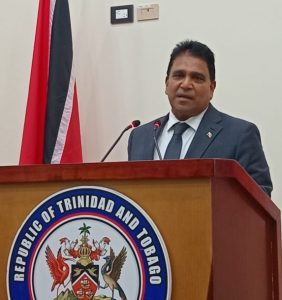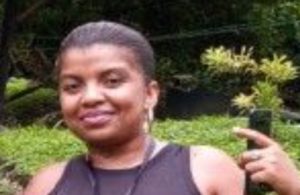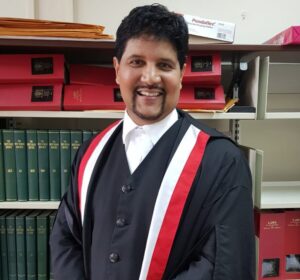By Sue-Ann Wayow
WELCOME to Bunsee Trace in Penal, south Trinidad.
It is a road that stems from the Penal Rock Road leading to Moruga and agriculture is the main form of income for the villagers.
It is also home to a volcano that has not constantly spewed mud for decades, much to the relief of its nearby neighbours.
Drive on the paved trace till the very end of civilization and venture into the woods but unless you have a tractor, you may not get very far on conventional wheels.
The site on approaching the volcano could be scenic depending on the traveller’s perception is supposed to be protected and maintained by the State.

However, when AZPNews.com visited earlier this year, it had become a dumping ground for garbage of all sorts, insects created colonies in the sheds designed for the weary walker and once strong infrastructure was dilapidated.
Passing through fields of teak trees and spreads of agricultural land, visitors are best advised to be prepared for the journey with proper shoes, lots of water and food and if travelling by day, a broad brimmed hat.
On a side note, I went with none of the above.
Further and further we walked until at one point, we were convinced we were lost. But continuing on for another 30 minutes, we found the spot that some had the privilege of reaching and even taking a dive into.

The volcano formally known as the L’eau Michel Mud Volcano is a beautiful sight and somewhat maintained. There were several mud pools with the largest being the centre of attraction.
It is one of 11 mud volcanoes in south Trinidad that have been studied as analog habitats for possible microbial life on planet Mars.

Beyond the volcano is bush. Through the bush, there is a pathway to a beach known as the L’eau Michel beach, a quarter-mile from the volcano.
And this is where our story begins again.
Open pathway for Venezuelans
The ocean meets another landmass with occupants who are anxious to make a perilous sea journey into the unknown Bunsee Trace stretch, it is alleged.
The Venezuelans are not going to sightsee and actually hope that no law enforcement officer sees them.
They travel by night and it is unknown whether they leave evidence in the form of mud-caked sneakers along the volcano’s trail.

They come in batches and ever so often may be greeted by blaring blue sirens.
Residents of Bunsee Trace told AZPNews.com that when they see the Venezuelans, they are torn between assisting and reporting them to the authorities.
Most opted for the former adopting a more humane approach.
The main item, the Venezuelans ask for upon arrival is a cellphone to make a call, perhaps to their insiders on land, the residents believe.
In addition, the residents assist with providing food and water for the strangers.
The issue of Venezuelans arriving in Trinidad and Tobago via perilous sea journeys is not a new one.
Stronger border protection
The Government has sought to have stronger border protection especially with the possibility of undetected Covid-19 cases filtering through the migrant population.
It is important to also note that Covid-19 vaccines in Trinidad and Tobago are available to everyone, regardless of legal or nationality status.

On August 30, Minister of National Security Fitzgerald Hinds attended the first meeting of a new expert working group to assist with the examination of the efficacy of the present border security arrangements. Beginning this month until December, the ministry’s Office of Law Enforcement Policy (OLEP) will host a series of meetings with the working group.
The group’s aim is to gather and analyse information, review global methods and draft a comprehensive plan to achieve an effective, efficient and proactive border control and migration management system.
In March, 24 Venezuelans including three infants were detained by police at Bunsee Trace. Three months before, six were arrested and charged at the same location. More recently, on September 14, 34 Venezuelans were arrested in Mayaro, 19 adults and 15 minors for illegal entry.
Spanish influence in the area
However, those who make it past the paved road and venture into civilization, once settled either legally or illegally, have contributed significantly to the development of Penal, Debe and environs, both negatively and positively.
President of the Penal/Debe Chamber of Commerce Rampersad Sieuraj said in 2020, he was informed that Venezuelans were entering the country via Bunsee Trace and in July, contacted former Minister of National Security Stuart Young and then Commissioner of Police Gary Griffith with information he had obtained from residents in the community.
The informants indicated that local villagers and even some members of the protective services aided and accommodated Venezuelans.
Since then to date, there has been little improvement in terms of more stringent police presence and Venezuelans continues to seek help from the residents.
Sieuraj said the Venezuelans used to come in boatloads but recently police have been cracking down on three main “tour guides,” and residents have said the number of migrants passing through that area has dwindled.
In terms of influence, he admitted that certain sectors were benefitting from the cheaper labour provided by the foreigners.
Sieuraj said, “The construction industry has benefitted from lower wages and greater productivity. Landlords have tenanted their property. The influx of Venezuelans – if controlled and regulated, the readily available manpower resources can be channelled in many skill sets for example carpentry, masonry and agriculture and consequently improve the productive capacity beneficial to community and immigrants. Venezuelans who are fluent in both Spanish and English can be involved in the literacy programmes where both languages can be taught and learnt for the benefit of all involved.”

This should serve as a wake-up call to locals given that the immigrants were an available source of cheaper, more productive and reliable source of labour, he said.
The flipside is a social cost with the increase of criminal activity and immorality with young Venezuelan girls being employed in the bars and nightclubs.
Sieuraj said, “One may however consider the accompanied cost to the social fabric of Penal and environs notwithstanding, the illegal activity which comes with every community and society.”
He recommends that in order to improve the lives of the Venezuelans and to reduce the strain on citizens, proper measures need to be put in place.
“Proper planning and regulations should be implemented by the authorities to ensure that the foreigners can be integrated into society and measurable by their ability to work, live and communicate in society beneficial to themselves and community. One can argue it may give reasons to improve or uplift the work ethics of Trinidadians, to become more productive, reliable and guarantee a fair days pay for a fair days work unlike what is presently available as we now have a manpower supply that is more willingly to work.”
The Chamber head also said that there were no negative statistics to show that the immigrants were not treated fairly in the Penal/Debe community.
And Chairman of the Penal/Debe Regional Corporation Dr Allen Sammy said across the world, history has proven that migration has shaped countries and cultures including Trinidad and Tobago’s.
He also shared Sieuraj’s opinions that Venezuelans have contributed much to the jurisdiction admitting that a better system was needed at entry points for more humane approaches to the population in need.
![]()

















Marcos Bompart
October 15, 2021I think that a “humane approach” it is the more inteligent attitude in the actual situation of venezuelan migrating to T&T just because of the irrational conditions living today for most of the population. It is time to act differently. Both sides, positive and negative, are faces of the human experience.